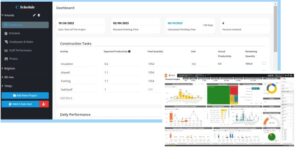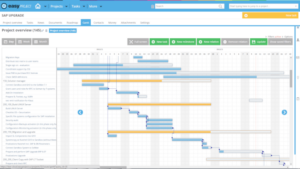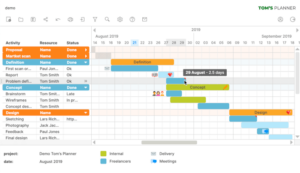Best project management software for small teams is essential for navigating the complexities of modern work. Without the right tools, small teams can struggle with communication, organization, and ultimately, project success. Project management software offers a centralized hub for task management, collaboration, and progress tracking, allowing small teams to streamline their workflows and achieve their goals more efficiently.
From task prioritization and deadlines to progress tracking and team communication, the right software can empower small teams to work smarter, not harder. By leveraging features like file sharing, project calendars, and real-time notifications, small teams can stay connected, informed, and on top of their projects, fostering a collaborative and productive work environment.
Introduction: Best Project Management Software For Small Teams
Project management software is a crucial tool for any team, especially small teams. It helps streamline workflows, improve communication, and ensure projects are completed on time and within budget. Without efficient project management tools, small teams often face numerous challenges, such as miscommunication, missed deadlines, and difficulty tracking progress.
Choosing the right project management software for small teams can be a challenge, especially with the abundance of options available. To make the right choice, consider your team’s specific needs and budget. You’ll want a solution that offers the core features like task management, collaboration tools, and communication channels.
But don’t forget to explore the broader landscape of best project management tools , as some might offer unique functionalities that could benefit your team. Ultimately, the ideal project management software for your small team will be the one that streamlines your workflows, enhances productivity, and keeps everyone on the same page.
The Importance of Project Management Software for Small Teams
Small teams often lack the resources and dedicated project managers found in larger organizations. This can lead to a lack of structure and coordination, making it difficult to effectively manage projects. Project management software provides a centralized platform for organizing tasks, tracking progress, and collaborating with team members.
- Improved Communication:Project management software provides a central hub for team communication, eliminating the need for multiple emails and instant messaging platforms. This reduces the risk of miscommunication and ensures everyone is on the same page.
- Enhanced Collaboration:The ability to assign tasks, track progress, and leave comments within the software fosters a collaborative environment. Team members can easily see what others are working on and contribute to projects effectively.
- Increased Productivity:By automating tasks, streamlining workflows, and providing clear visibility into project progress, project management software helps teams work more efficiently.
- Improved Time Management:Project management software helps teams prioritize tasks, set deadlines, and track progress against milestones. This ensures projects are completed on time and within budget.
- Enhanced Accountability:Project management software allows team members to track their progress and contributions to projects. This promotes accountability and helps ensure everyone is pulling their weight.
“Project management software is an essential tool for small teams looking to improve efficiency, collaboration, and overall project success.”
Best Practices for Effective Software Implementation
Successfully implementing project management software in a small team is crucial for streamlining workflows, improving communication, and ultimately, achieving project goals. While choosing the right software is important, its effectiveness hinges on a smooth implementation process. This section Artikels best practices to ensure a seamless transition and maximize the benefits of your chosen project management tool.
Choosing the right project management software for your small team can be a game-changer, helping you stay organized and on track. But if you’re looking for a way to boost your team’s morale and potentially earn some extra cash, check out this top 10 real money earning games guide.
Once you’ve had your fun, you can return to the task at hand with renewed energy and focus, making your project management software even more effective.
Importance of Clear Communication, Training, and User Adoption
Effective communication is the cornerstone of successful software implementation. Clear communication ensures everyone understands the software’s purpose, features, and how it will impact their daily tasks. This can be achieved through:
- Regular communication channels:Establish clear communication channels for addressing questions, sharing updates, and resolving issues. This could include team meetings, email threads, or dedicated project management channels within the software itself.
- Comprehensive training:Offer comprehensive training sessions to familiarize team members with the software’s functionalities. This training should be tailored to different roles and responsibilities within the team, ensuring everyone understands how the software supports their specific tasks.
- User adoption strategies:Encourage user adoption by showcasing the software’s benefits through real-life examples, demonstrating how it simplifies workflows, and highlighting the positive impact it can have on team productivity.
Establishing Workflows, Assigning Roles, and Tracking Progress
Once the team is familiar with the software, it’s essential to establish clear workflows, assign roles, and implement effective progress tracking mechanisms. This involves:
- Defining workflows:Develop standardized workflows for common tasks, such as project initiation, task assignment, progress updates, and issue resolution. These workflows should be documented and accessible to all team members.
- Role assignment:Clearly define roles and responsibilities within the software. Assign specific tasks and projects to team members based on their skills and expertise. This ensures accountability and efficient task allocation.
- Progress tracking:Implement robust progress tracking mechanisms. Utilize the software’s built-in features to monitor task completion, track milestones, and visualize project progress. This allows for real-time insights into project status and identifies potential roadblocks early on.
Tips for Optimizing Software Usage

Project management software is a powerful tool for small teams, but its effectiveness depends on how well it’s implemented and used. Optimizing your software usage can significantly enhance team collaboration, productivity, and project outcomes.
Streamlining Workflows
Effective workflow management is crucial for maximizing the benefits of project management software. By organizing tasks logically and ensuring smooth transitions between stages, teams can eliminate bottlenecks and improve efficiency.
- Define clear project phases:Break down projects into distinct phases, such as planning, execution, and completion. This allows for better tracking of progress and identification of potential roadblocks.
- Establish standardized processes:Implement consistent workflows for common tasks, such as task assignment, communication, and reporting. This promotes predictability and reduces confusion.
- Utilize automation:Leverage automation features to streamline repetitive tasks, such as sending notifications or generating reports. This frees up team members to focus on more strategic work.
Automating Tasks
Automating repetitive tasks can save valuable time and effort, allowing teams to focus on higher-value activities.
- Task reminders and notifications:Set up automated reminders and notifications for deadlines, task assignments, and important updates. This ensures that everyone stays on track and avoids missed deadlines.
- Progress tracking and reporting:Utilize software features to automatically track progress and generate reports. This provides real-time insights into project status and helps identify areas for improvement.
- Time tracking and billing:Integrate time tracking features to automatically record hours spent on tasks. This can be used for accurate billing and project cost analysis.
Leveraging Reporting Features, Best project management software for small teams
Project management software provides valuable insights through reporting features.
- Project status reports:Regularly review project status reports to track progress, identify potential risks, and make informed decisions.
- Resource allocation analysis:Analyze resource allocation data to identify potential bottlenecks and optimize team utilization.
- Task completion rates:Monitor task completion rates to assess team performance and identify areas for improvement.
Final Wrap-Up
Choosing the best project management software for your small team is a crucial decision. By carefully considering factors like budget, team size, project complexity, and integration needs, you can find the perfect solution to empower your team, streamline workflows, and achieve remarkable results.
Remember to prioritize user-friendliness, mobile accessibility, and customer support, ensuring a seamless and productive experience for your entire team.





